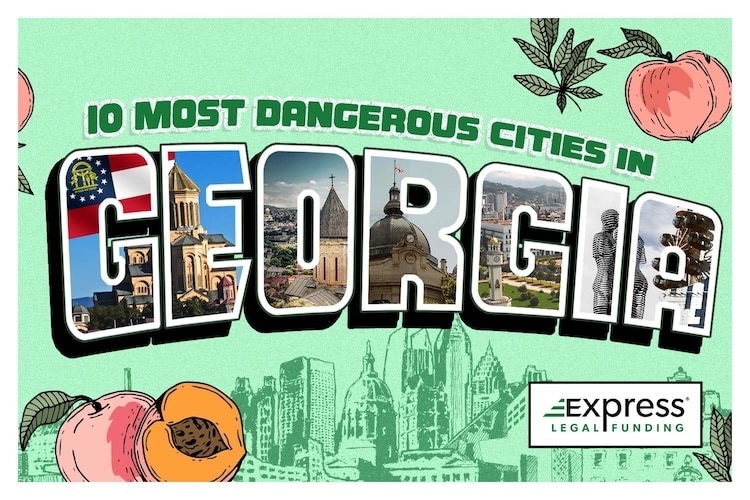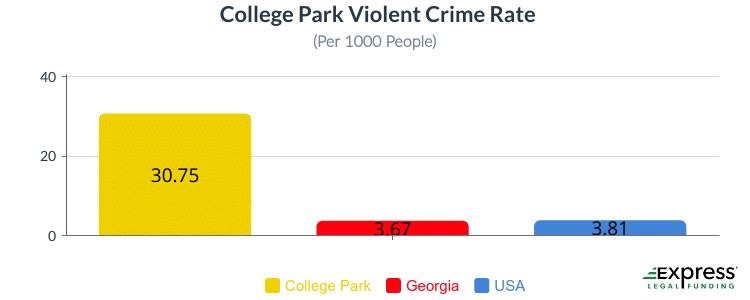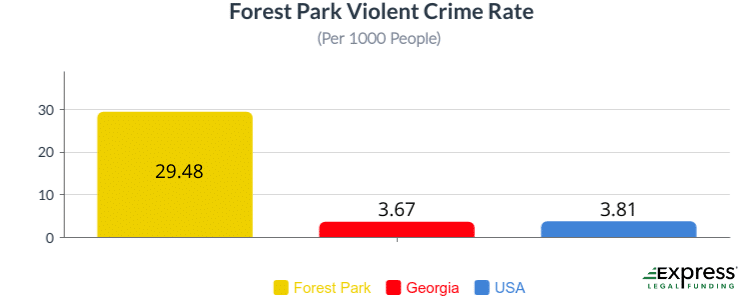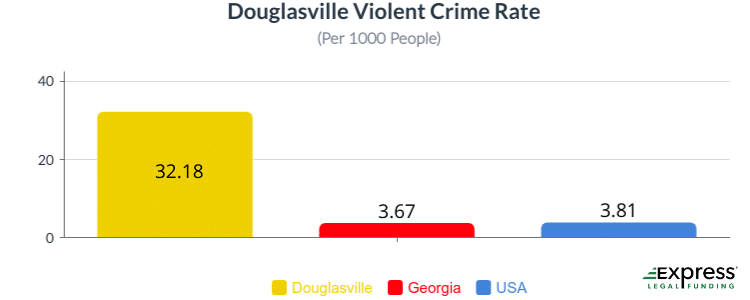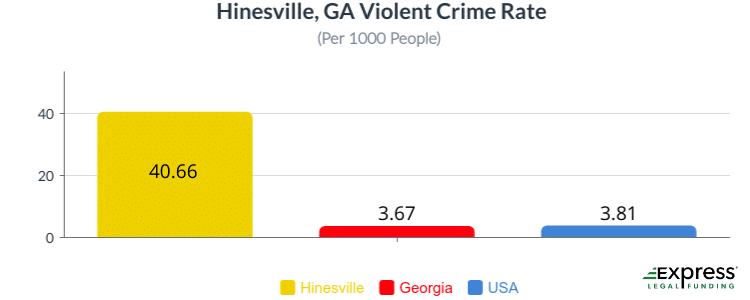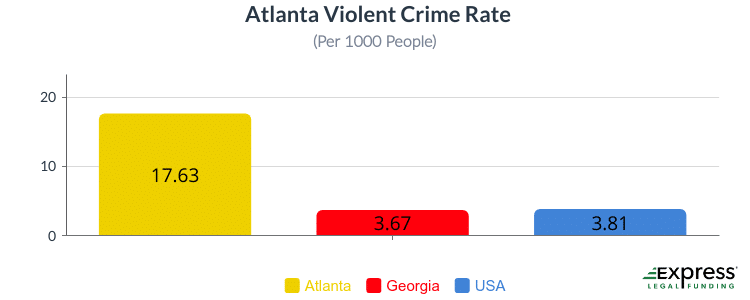
Nestled in the heart of the southeastern United States is the state of Georgia, which stands as a true testament to the rich and bittersweet tapestry of American history, culture, and beauty.
Known affectionately as the “Peach State,” Georgia is the 8th most populous state in the USA and the 24th-largest by area.
The state offers a unique blend of bustling metropolitan areas, quaint small towns, and lush terrains that attract millions of visitors and new residents each year.
From the vibrant streets of Atlanta, the state’s capital and largest city, to the serene shores of the Atlantic on Tybee Island, Georgia encapsulates the diverse experiences that define the American South.
Unfortunately, like other states in the region, Georgia has its share of crime and poverty-related difficulties beneath the friendly surface of its Southern hospitality and proud traditions.
In addition to discussing Georgia’s crime trends in this article, we provide a list of the top 10 most dangerous cities in Georgia, including crime rate stats to back it up.
With that said, let’s get moving.
Most Dangerous Georgia Cities Map and Crime Rate Trends
With the help of verified statistics and data from local police and state and national law enforcement authorities, we have created a list of the top 10 most dangerous places in Georgia.
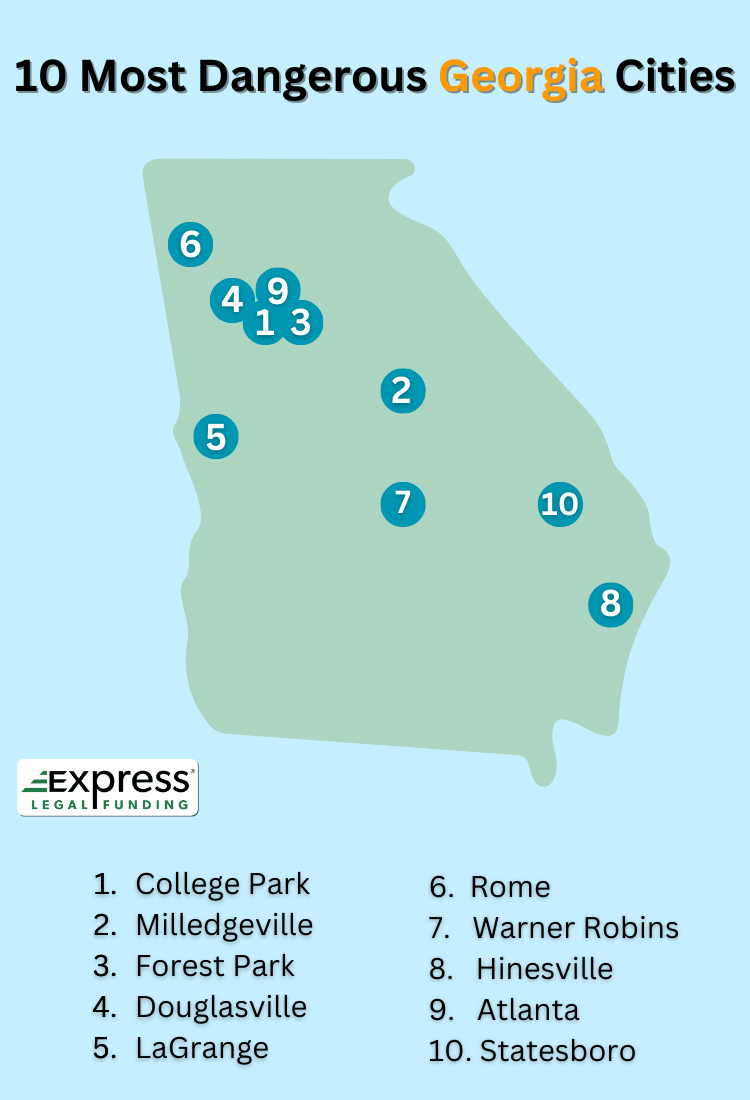
So, by reading this article, you will not only learn which Georgia cities have the highest crime rates but also understand the top underlying factors contributing to certain places in Georgia being more dangerous to live in than others.
Georgia Crime Rate Ranking and Data Trends
As we have done in our other most dangerous cities articles regarding other states (10 most dangerous cities in Texas and 10 most dangerous cities in Virginia), let’s begin by delving into the crime rate data for Georgia as a state.
We will discuss the overall trends of the crime committed in the state.
Data collection comes with many challenges, and thus, we want to express our appreciation to the police departments and many government agencies, such as the Georgia Bureau Of Investigation, for their efforts in providing us with reliable statewide crime stats.
Initiatives like the Georgia’s Uniform Crime Reporting (UCR) Program (derived from the Federal Bureau of Investigation’s national program) are successful pieces of the anti-crime puzzle.
The UCR serves as the state repository for the collection of crime statistics, giving state policymakers direction.
At present, there are more than 18,000 agencies that contribute to increasing the accuracy of these crime rates, which is also available to be viewed on the FBI’s Crime Data Explorer (CDE).
Total Crime By Category In Georgia
As per the latest reports of the Uniform Crime Reporting (UCR) Program released by the Georgia Crime Information Center, here is an infographic with statistics for the various types of crimes reported to authorities in a year.
The total property crime count was 165,531, which was 81.74% of the crime reported. The total violent crime count was 36,705, which was 18.13% of the reported crimes.
These stats indicate that four out of every five reported criminal offenses in Georgia annually are property crimes and do not involve violence.
Similarly, that means that you are significantly more likely to be a victim of a property crime than a violent crime when visiting Georgia.
What is the crime rate in Georgia?
Georgia’s Violent Crime Rate Is 3.67 and 3.7% Better Than the National Average
According to the FBI Crime Data Explorer, the state of Georgia’s violent crime rate stands at 3.67 incidents per 1,000 residents, which is better than the national average of 3.81.
Even while better than the rest of the United States average, the violent crime rate in Georgia is on the rise and 12.51% higher than it was pre-pandemic in 2019 (like many states, Georgia saw violent crime spike during the COVID-19 lockdowns).
Georgia’s Property Crime Rate Is 16.9 and 13.3% Better Than the National Average
The annual rate for all types of property crime in Georgia increased slightly from the previous year but remained much lower than its most recent high five years ago in 2019, of 27.7, higher than the national average of 21.3 out of 1000 persons that same year.
When it comes to gun violence, the state has seen an increase of 4.95% year over year.
In 2023 alone, There Were 25 Mass Shooting Incidents In Georgia.
Before we continue discussing the characteristics of Georgia’s crime rates, let’s clarify the types of offenses that are considered violent crimes or property crimes, respectively.
The consistency of these two types of crime category systems allows for the crime rate data to be uniform countrywide, not just throughout the state of Georgia.
Violent Crime Vs. Property Crime Definitions In Georgia [Infographic]

The FBI’s Uniform Crime Reporting System (UCR) defines property crimes as those committed with the intent to steal money or property without the force or the threat of force perpetuated against the victims.
The definition of property crime includes the following four offense types:
Property Crime Offenses
- Burglary
- Larceny-theft (i.e., purse snatching or retail shoplifting)
- Motor vehicle theft (i.e., car theft not involving violence or threat of violence)
- Arson
Learn more about larceny-theft offenses in America in our new guide. It covers shoplifting statistics using data from our 2024 survey, which focuses on retail theft from the customer’s perspective.
Store owners looking for legal options to fight retail theft should read our guide about the shopkeeper’s privilege law.
In addition to defining property crime, the FBI’s Uniform Crime Reporting (UCR) defines what is considered a violent crime offense. These charges can also apply to stealing. However, they all involve force or threat of force. This category consists of four types of offenses:
Violent Crime Offenses
- Murder and non-negligent manslaughter
- Rape
- Robbery
- Aggravated assault
Like many things, the most common characteristics of violent crimes committed in Georgia vary when compared to other states.
Most Common Weapons Used For Violent Crimes In Georgia
The most common weapons used to perpetuate violent crimes in Georgia can be summarized as follows:
Handguns are used in 28% of all violent crimes in Georgia, followed by personal weapons (i.e., fists or hands) and firearms as being the three most common.
While much rarer, 0.26% of all violent crime offenses reported in Georgia involve using Drugs/Narcotics/Sleeping Pills or Poison to commit the crime (i.e., drug-facilitated sexual assault).
Georgia Violent Crime Rate Demographic Trends
When we analyze the age demographic for all types of violent crime, here’s the distribution among different age groups.

Most Violent Crimes Are Committed By People Under 40 Years Old
64.26% of violent crimes are committed by persons under the age of 40 in Georgia.
Out of the under-40 violent crime offender age group, 27% of the offenders were between the ages of 20-29, followed by the 30-39 age range at 21%.
Average Age of Victims In Violent Crimes
The average age of violent crime victims closely mirrors that of violent crime offenders in Georgia. The slight disparity can be attributed mainly to the lopsided victim-to-offender ratio among children under the age of 10.
70% of victims of violent crime are under the age of 40 in Georgia, with 25.08% of violent crime victims being between the ages of 20-29, the highest among any age group.
Most Common Location of Violent Crime Incidents Is At Home
The most recent CDE data indicates that the most common crime location where violent crimes are committed in Georgia is at the residence of the victim (often domestic incidents), sitting at 58%.
This is followed by Highway/Alley/Street/Sidewalk and Parking Garage/Lot for the second and third most common locations where violent crimes occur in Georgia at 14% and 5%, respectively.
Victim Usually Has Relationship With Offender of Violent Crime
The offender is not a stranger to the victim the majority of the time for reported violent crimes in Georgia.
Acquaintances and boyfriend/girlfriend relationships are the two most common descriptions for the type of relationship between violent offenders and their victims.
Men Are More Likely To Commit Violent Crimes Than Women
There is a significant disparity among the demographic of the offender’s gender for violent crimes in Georgia.
Over 75% of violent crimes in Georgia are committed by males.
The Gender of Violent Crime Victims Is Closely Split Between Men and Women
In Georgia, the victims of violent crimes have an almost equal distribution among males and females.
50.25% of the victims of violent crimes are male, while 49.45% are female (0.33% are listed as gender unknown).
As we delve into the top 10 dangerous cities in Georgia, having distinguished between property and violent crimes, let’s explore the cities that top the list based on crime rate data trends.
Why can you trust our list of the top 10 most dangerous cities in Georgia?
This compilation of the worst cities in Georgia for crime is a reliable reference, as it is built using objective facts and data gathered by federal sources from local and state agencies across Georgia rather than mere personal opinions.
Standard Crime Rate Formula
We use a standard system for determining a city’s crime rate using publicly available total crime and census statistics we obtained from official federal government websites and sources.
It works for both property and violent crime types and for calculating a city or state’s total crime index.
The formula to determine what are the most dangerous Georgia cities to live in consists of two steps, which are as follows:
- Divide the total number of reported crimes by the city’s total population size.
- Multiply the result of the first step by 1,000, which produces the final crime rate.
Most Dangerous Georgia Cities Ranking System
We use a total crime rate index to determine a city’s position on our list of the top 10 dangerous cities in Georgia, including all reported violent and property crimes reported in a city combined per 1,000 residents.
We filtered out small cities with small populaces, like Morrow, where a lack of residents causes the crime rate to appear much higher than the actual level of danger for those in a given city and incongruent with other factors like poverty.
Disclaimer: It is important to note that an inherent challenge that all worst places to live and crime ranking systems face is that they do not include unreported offenses. This problem is made worse in areas where residents distrust police officers and are reluctant to report crimes.
Now that you know where we get the Georgia crime rate data from and the inner workings of the system we use to determine the level of a city’s crime for ranking, let’s answer the question, “What are the most dangerous cities in Georgia?”
Top 10 Most Dangerous Cities In Georgia 2024
- College Park
- Milledgeville
- Forest Park
- Douglasville
- LaGrange
- Rome
- Warner Robins
- Hinesville
- Atlanta
- Statesboro
What city in Georgia has the highest crime rate?
Among the 535 municipalities in Georgia, College Park is ranked as the city with the highest crime rate in Georgia, ranking number one on our list of the most perilous places to reside based on crime statistics.
College Park
Split between Fulton and Clayton Counties, College Park is the 96th largest city in Georgia (a 9.1-mile drive from southwest of Atlanta) and was initially named Atlantic City when it was founded as a railroad depot in 1890.
Six years later, in 1896, it was renamed College Park as the city was home to Cox College and the Georgia Military Academy (the Woodward Academy in the present day).

The city’s latitude-running streets are named after Ivy League colleges, while longitude-running streets are named after prominent early residents, showcasing the city’s historical and educational pride.
The economy of College Park is diverse considering its relatively smaller population size, with Chick-fil-A headquartered there and the Federal Aviation Administration being the two largest employers of College Park residents.
The city is also home to the Georgia International Convention Center, the newest and second-largest in the state, and the $45 million Gateway Center Arena (5,000 seats), where the College Park Skyhawks (NBA G League) and the Atlanta Dream (WNBA) teams play.
Both buildings have contributed to the local economy and overall community engagement in College Park since their construction.
According to the United States Census Bureau, the percentage of people living below the poverty level in College Park is 18.3%, higher than the national average, yet much improved, as the poverty rate is less than half of what it was ten years ago when it peaked at 40.01% in 2014.
What is the crime rate in College Park, Georgia?
The Total Crime Rate In College Park Is 142.34
For every 1,000 people living in College Park, Georgia, 142.34 crimes are reported to the city’s law enforcement annually.
College Park’s Violent Crime Rate Is 30.75
For every 1,000 people living in College Park, 30.75 violent crimes are reported to the city’s law enforcement each year.
College Park’s Property Crime Rate Is 111.59
The property crime rate in College Park is 111.59. That means for every 1,000 people living in College, 111.59 property crimes are reported to the city’s law enforcement each year.
College Park Crime Rate Stats
- Population: 13,917
- Total Violent Crimes: 428
- Total Property Crimes: 1,553
- Violent Crimes per 1000 persons: 30.75
- Property Crimes per 1000 persons: 111.59
Is College Park, GA, Safe?
No, statistically speaking, College Park is not a safe place. Solely focusing on its high total crime rate, the city of College Park is the worst place to live in Georgia.
Why Is College Park So Dangerous?
A long history of a high poverty rate and income inequality are some of the most significant precipitating factors for College Park’s high crime rate, making it the most dangerous city in Georgia.
Most Dangerous Areas and Neighborhoods In College Park
- Jamestown Court
- College Park South
- Hartsfield Jackson Atlanta International Airport area
- Avery Townhomes
- Embarcadero Club
- Manchester Ridge
Safest Neighborhoods In College Park
- Grant Park
- Princeton Village
- Safest Suburbs In the College Park Area
- Elmwood Park
- Golden Acres
- Granada
- Wayfields
Milledgeville
Milledgeville is the 74th largest city in Georgia and is located in the heart of the state alongside north-south running US Route 441.
Serving as the capital of Georgia from 1804 to 1868 (succeeded by Atlanta), Milledgeville’s name originated from an act passed by the Georgia state legislature in 1803 to name a town in honor of its then-governor, John Milledge.

In the years leading up to the Civil War, Milledgeville was a bastion of wealth and power.
Before its founding as a city, the land had long been home to Native American tribes who were forced to relocate following the Treaty of Fort Wilkinson in 1802.
Recent US Census Bureau data reveals that Milledgeville has a poverty rate of 39.9%, one of the worst in the nation, which is likely a contributing factor to its high crime rate.
What is the crime rate in Milledgeville, Georgia?
The Total Crime Rate In Milledgeville Is 120.75
For every 1,000 people living in Milledgeville, 120.75 crimes are reported to the city’s law enforcement annually.
Milledgeville’s Violent Crime Rate Is 44.97
The violent crime rate in Milledgeville is 44.97; for every 1,000 people living in Milledgeville, 44.97 violent crimes are reported to the city’s law enforcement each year.
Milledgeville’s Property Crime Rate Is 75.78
The property crime rate in Milledgeville is 75.78; for every 1,000 people living in Milledgeville, 75 property crimes are reported to the city’s law enforcement each year.
Milledgeville Crime Rate Stats
- Population: 17,102
- Total Violent Crimes: 769
Total Property Crimes: 1,296
Violent Crimes per 1000 persons: 44.97 - Property Crimes per 1000 persons: 75.78
Most Dangerous Areas In Milledgeville
- Burlington Park
- Midgeville Southeast
- Milledgeville Northwest
Safest Neighborhoods In Milledgeville
- Blandy
- Milledgeville North
- Milledgeville East
Safest Suburbs In the Milledgeville Area
- Meriwether
- Underwood
- Scottsboro
- Haddock
Forest Park
Forest Park is the 60th largest city in Georgia and is located in Clayton County, about nine miles south of Atlanta.
The city can trace its origins back to the early 1800s when it first served as a crucial “wood and water stop” for the railroad system developing across the country.

Initially known as Stump Town due to the countless tree stumps left from the trees cut down to provide wood to be used as fuel for the trains on the Macon and Western Railroad.
Forest Park was officially incorporated as a city in 1908 and has since undergone multiple name changes before adopting its current name, including its name being spelled as “Forrest” with two “r’s” instead of only one as it is presently.
Roscoe Thompson, one of the first NASCAR Cup Series drivers, was born in Forest Park.
The median per capita income in Forest Park is $27,800, which, while a significant increase compared to a few years ago, is considered lower income relative to Georgia and the rest of the US.
Similarly, Forest Park’s poverty rate of 17.7% is less than half of what it was a decade earlier but remains higher than the Georgia and national poverty rate averages.
Studies show a correlation between higher percentages of people living below the poverty level and high crime rates.
What is the crime rate in Forest Park?
The Total Crime Rate In Forest Park Is 107.73
For every 1,000 people living in Forest Park, 107.73 crimes are reported to the city’s law enforcement annually.
Forest Park’s Violent Crime Rate Is 8.83
The violent crime rate in Forest Park is 8.83; for every 1,000 people living in Forest Park, 8.83 violent crimes are reported to the city’s law enforcement each year.
Forest Park’s Property Crime Rate Is 29.48
The property crime rate in Forest Park is 29.48; for every 1,000 people living in Forest Park, 29.48 property crimes are reported to the city’s police department each year.
Forest Park Crime Rate Stats
- Population: 19,605
- Total Violent Crimes: 578
- Total Property Crimes: 1,534
- Violent Crimes per 1000 persons: 29.48
- Property Crimes per 1000 persons: 78.25
Is Forest Park, GA, Safe?
No, from a crime statistics perspective, Forest Park is not a safe place to live.
Most Dangerous Neighborhoods In Forest Park
- Downtown
- Mountain View Plaza
- Forest Park Southeast
- Fairlane
- Clayton Manor
Safest Neighborhoods In Forest Park
- Forest Park South
- Cone Road and Ash Street area
- Forest Park East
Safest Suburbs In the Forest Park Area
- Rolling Meadows
- Plunket Town
- Hapeville
- Rex (30273 zip code)
Douglasville
Douglasville, Georgia, is the 33rd largest city in Georgia and is located in Douglas County, about 20 miles to the west of Atlanta.
The city was founded in 1874 alongside the construction of the railroad in the region and was named for the prominent Illinois Senator Stephen Arnold Douglas, who died in 1861.

Douglasville was initially known as “Skint Chestnut” based on the presence of a large tree in the area stripped of bark that Native Americans used as a navigational landmark.
Native Americans originally inhabited the area until they were forced to leave as a result of the signing of the Indian Removal Act by President Andrew Jackson in 1830.
In the winter of 1838-1839, thirteen thousand Cherokees were forcibly marched west under harsh conditions on what is now known as the Trail of Tears. Thousands died on the journey.
On September 21, 2009, Douglasville suffered the worst flood in Georgia history due to 18″ of rain falling in a single night. Douglas County was declared a disaster area. In addition to causing fatalities, many roadways and homes were destroyed by the flood water.
Douglasville’s historic downtown has been recognized on the National Register of Historic Places since 1989 and features a collection of commercial buildings that exhibit unique Victorian-era architectural styles ranging from Romanesque to Italianate and Queen Anne.
This picturesque setting has attracted the movie and TV film industries, including productions such as “The Founder” (about McDonald’s), multiple “The Hunger Games” movies, and “Finding Carter,” a shortlived MTV series, and Netflix’s “Stranger Things” series.
Specifically, the building used to represent the outside of Hawkin’s Police Department, where Sherriff Jim Hopper works in “Stranger Things,” is in Douglasville.
Walmart and Kroger are among the largest employers of Douglasville residents.
While the median income in Douglasville has increased in recent years, so have the city’s property and violent crime rates.
The poverty rate among Douglasvile residents is 10.8%, which is better than both the Georgia and national poverty rate averages.
What is the crime rate in Douglasville, Georgia?
The Total Crime Rate In Douglassville Is 105.58
For every 1,000 people living in Douglasville, 105.58 crimes are reported to the city’s law enforcement annually.
Douglasville’s Violent Crime Rate Is 32.18
The violent crime rate in Douglasville is 32.18; for every 1,000 people living in Douglasville, 32.18 violent crimes are reported to the city’s law enforcement each year.
Douglasville’s Property Crime Rate Is 73.41
The property crime rate in Douglasville is 73.41; for every 1,000 people living in Douglasville, 73.41 property crimes are reported to law enforcement each year.
Douglasville Crime Rate Stats
- Population: 36,331
- Total Violent Crimes: 1,169
- Total Property Crimes: 2,667
- Violent Crimes per 1000 persons: 32.18
- Property Crimes per 1000 persons: 73.41
Is Douglasville, GA, Safe?
No, from a crime rate perspective, Douglasville is not a safe place and ranks as one of the worst places to live in Georgia.
Most Dangerous Areas and Neighborhoods In Douglasville
- Willows North
- Burton Mill
- Anneewakee Trails
- Lincoln Heights
- Connally
Safest Neighborhoods In Douglasville
- Orchard Point
- Fouts Mill
- Shallowford Heights
- Governors Ridge
Safest Suburbs Near Douglasville
- Winston (30187)
- Bill Arp (unincorporated community)
- Mableton
LaGrange
LaGrange, Georgia, is the 43rd largest city in Georgia and is located in Troup County, near the Georgia/Alabama border (approximately 60 miles southwest of Atlanta). The city, incorporated in 1828, was named at the suggestion of Colonel Julius Caesar Alford.
Alford based the suggestion on his overhearing French aristocrat and American Revolutionary hero Marquis de La Fayette’s remark about how the area’s topography appeared similar to that of his wife’s countryside estate named LaGrange outside Paris, France.

Prior to the Civil War, LaGrange and Troup County were centers of commerce and saw much prosperity. Troup was the fifth-largest slaveholding county in Georgia at the time.
Economically, LaGrange has a diverse list of employers per capita but a poverty rate of 24.1%, more than double the national average (11.5%).
The major employers of LaGrange residents include Wal-Mart, Duracell, Caterpillar, and the Kimberly-Clark Corporation, among others.
What is the crime rate in LaGrange, Georgia?
The Total Crime Rate In LaGrange Is 103.31
For every 1,000 people living in LaGrange, 103.31 crimes are reported to the city’s law enforcement annually.
LaGrange’s Violent Crime Rate Is 36.46
The property crime rate in LaGrange is 36.46; for every 1,000 people living in LaGrange, 36.46 property crimes are reported to the city’s police department each year.
LaGrange’s Property Crime Rate Is 66.85
The property crime rate in LaGrange is 66.85; for every 1,000 people living in LaGrange, 66.85 property crimes are reported to the city’s police department each year.
LaGrange, GA Crime Rate Stats
- Population: 32,146
- Total Violent Crimes: 1,172
- Total Property Crimes: 2,149
- Violent Crimes per 1000 persons: 36.46
- Property Crimes per 1000 persons: 66.85
Most Dangerous Neighborhoods In LaGrange
- LaGrange Northeast
- Whitfield
- Big Spring Mountville and Knott intersection area
Safest Neighborhoods In LaGrange
- Pyne
- Piedmont Heights
- Cannonville Road area
Safest Suburbs and Cities Close To LaGrange Area
- Harrisonville (unincorporated community)
- Hogansville
- Lone Oak
Rome
Rome, GA, is the 30th largest city in Georgia and was founded in 1834 to accommodate the increase of settlers in Georgia.
Situated in Floyd County in northwest Georgia, Rome was initially inhabited by the Cherokee people and other Native American tribes before they were forced to leave under the Indian Removal Act in 1830.

The city’s name was chosen by early European-American settlers, drawing on the comparison between its topography and that of Rome, Italy, which is also built on seven hills.
From its early days through the Great Depression, Rome, Georgia’s economy was significantly agricultural-based, much of which focused on cotton.
In more recent history, Rome has become well-known in the region for its medical and healthcare facilities and for being home to the Rome Emperors, a minor-league baseball team (previously named the Rome Braves).
Although the percentage of people living below the poverty level in Rome, Georgia, has dropped to 21.2%, it is still significantly higher than the averages for the rest of Georgia and the United States.
What is the crime rate in Rome, Georgia?
The Total Crime Rate In Rome, GA, Is 100.75
For every 1,000 people living in Rome, Georgia, 100.75 crimes are reported to the city’s law enforcement annually.
Rome’s Violent Crime Rate Is 38.41
The violent crime rate in Rome is 38.41; for every 1,000 people living in Rome, 38.41 violent crimes are reported to the city’s law enforcement each year.
Rome’s Property Crime Rate Is 62.34
The property crime rate in Rome is 62.34; for every 1,000 people living in Rome, 62.34 property crimes are reported to the city’s police department each year.
Rome, GA Crime Rate Stats
- Population: 37,778
- Total Violent Crimes: 1,451
- Total Property Crimes: 2,355
- Violent Crimes per 1000 persons: 38.41
- Property Crimes per 1000 persons: 62.34
Most Dangerous Neighborhoods and Areas In Rome
- Shannon
- Wax
- South side of Rome
- Desoto Homes (public housing project)
Safest Neighborhoods In Rome
- Berry College
- Rome Northwest
- Berwin
- North part of Rome
Safer Location Suburbs and Alternatives In the Rome, GA Area
- Farmville
- Cave Spring
- Lindale
Warner Robins
Warner Robins is the 13th largest city in Georgia and is split between Houston and Peach counties. The city’s strategic location near major transportation routes and robust economy make it an attractive destination for businesses and families alike.
Initially, the small farming community of Wellston, Warner Robins, was founded (and soon after renamed) in 1942 to house a US Army Air Depot to aid in the World War II war effort.

The city’s name comes from the first commander of the air depot, wanting to name the town after his mentor, Augustine Warner Robins. It has since evolved into a vibrant and diverse community.
Robins Air Force Base is one of the largest employers in the region and a significant contributor to the local economy.
The percentage of people living below the level of poverty in Warner Robins has decreased significantly over the past eight years and is 11%, which is better than both the Georgia and national poverty rate averages.
What is the crime rate in Warner Robins, Georgia?
The Total Crime Rate In Warner Robins Is 94.06
For every 1,000 people living in Warner Robins, 94.06 crimes are reported to the city’s law enforcement annually.
Warner Robins’ Violent Crime Rate Is 34.16
The violent crime rate in Warner Robins is 34.16; for every 1,000 people living in Warner Robins, 34.16 violent crimes are reported to the city’s law enforcement each year.
Warner Robins’ Property Crime Rate Is 59.90
The property crime rate in Warner Robins is 59.9; for every 1,000 people living in Warner Robins, 59.9 property crimes are reported to the city’s law enforcement each year.
Warner Robins’ Crime Rate Stats
- Population: 82,409
- Total Violent Crimes: 2,815
- Total Property Crimes: 4,936
- Violent Crimes per 1000 persons: 34.16
- Property Crimes per 1000 persons: 59.90
Most Dangerous Parts of Warner Robins
- Todd Circle and Kimberly Road
- Memorial Park
- City Center
- Peachtree Circle and Shirley Drive
- Carl Vinson Parkway and King Richard Drive
Safest Neighborhoods In Warner Robins
- Feagin Mill Rd and Bonanza Dr
- Sleepy Lane and Pioneer Trails
- Kathleen
- Feagin Mill Road and Bonanza Drive
Safe Places To Live Near Warner Robins
- Robins Air Force Base
- Echeconnee
- Bonaire
- Centerville
Hinesville
Hinesville, Georgia, is the 35th largest city in Georgia, located in Liberty County on the Atlantic Coastal Plain region.
Founded in 1837, Hinesville is named after state senator Charlton Hines, a prominent Liberty County figure at the time.

The city’s close proximity to Fort Stewart, the largest military installation east of the Mississippi River, has significantly influenced its development and culture.
The percentage of people living below the level of poverty in Hinesville is 15.8%, which is higher than both the Georgia and national averages, has remained relatively stable over the past decade.
What is the crime rate in Hinesville, Georgia?
The Total Crime Rate In Hinesville, GA, Is 86.3
For every 1,000 people living in Hinesville, 86.3 crimes are reported to the city’s law enforcement annually.
Hinesville’s Violent Crime Rate Is 40.66
The violent crime rate in Hinesville is 40.66; for every 1,000 people living in Hinesville, 40.66 violent crimes are reported to the city’s law enforcement each year.
Hinesville’s Property Crime Rate Is 46.07
The property crime rate in Hinesville is 46.07; for every 1,000 people living in Hinesville, 46.07 property crimes are reported to the city’s law enforcement each year.
Hinesville, GA Crime Rate Stats
- Population: 35,443
- Total Violent Crimes: 1,441
- Total Property Crimes: 1,633
- Violent Crimes per 1000 persons: 40.66
- Property Crimes per 1000 persons: 46.07
Most Dangerous Parts of Hinesville
- Downtown Hinesville
- Eastern parts of Hinesville
- South and southeast areas of Hinesville
Safest Neighborhoods In Hinesville
- Ridgewood
- West and southwest areas of Hinesville
- Sherwood Forest (31313)
Safest Cities and Suburbs In the Hinesville Area
- Flemington
- Gumbranch
- Sweet Hill (31324)
- Fancy Hall (Bryan County)
Atlanta
Atlanta is the capital and largest city of the state of Georgia, located in both Fulton and Dekalb counties. From a regional perspective, Atlanta is situated in the state’s northwestern quadrant within the foothills of the Blue Ridge Mountains.
Since its early days, Atlanta has been a major railroad hub for the southeastern United States.
In our present time, the Atlanta metropolitan area has grown to be a central hub for transportation, commerce, and industry with an international presence.

The city played a pivotal role in the Civil Rights Movement of the 1960s as a major organizing center for Christian minister and civil rights leader Martin Luther King Jr., who was born in Atlanta. It continues to be a center for social and political activism in 2024.
The Atlanta metropolitan area also has a reputation for being a city strong in higher education due to the fact that it has more than 15 colleges and multiple law schools and medical schools, including institutions such as
- Georgia Institute of Technology (Georgia Tech)
- Emory University
- Georgia State University
All of which attracts students from around the globe.
The majority of Atlanta residents have a bachelor’s degree or higher, 51.7% to be exact, which is significantly higher than the national average of 31.99%.
Even with most people in Atlanta having earned at least a bachelor’s, the percentage of people living below the poverty level status in Atlanta is 16.5%, which is higher than both the Georgia and national averages, although it has improved year-over-year since 2015.
The higher poverty rate and disparity in median household income by race are contributing factors to the city’s higher-than-average crime rate.
What is the crime rate in Atlanta, Georgia?
The Total Crime Rate In Atlanta Is 74.48
For every 1,000 people living in Atlanta, Georgia, 74.8 crimes are reported to the city’s law enforcement annually.
Atlanta’s Violent Crime Rate Is 17.63
The violent crime rate in Atlanta is 17.63; for every 1,000 people living in Atlanta, 17.63 violent crimes are reported to the city’s law enforcement each year.
Atlanta’s Property Crime Rate Is 56.85
The property crime rate in Atlanta is 56.85; for every 1,000 people living in Atlanta, 56.85 property crimes are reported to the city’s law enforcement each year.
Is Atlanta a Dangerous City?
Yes, from a crime rate perspective, Atlanta is a dangerous city, with some areas of the capital of Georgia being more unsafe than others.
Atlanta, GA Crime Rate Stats
- Population: 495,707
- Total Violent Crimes: 8,740
- Total Property Crimes: 28,181
- Violent Crimes per 1000 persons: 17.63
- Property Crimes per 1000 persons: 56.85
Most Dangerous Atlanta Neighborhoods
- Oakland City
- Adair Park
- Adamsville
- Lakewood Heights
- Mechanicsville
- West End
- English Avenue
- Grove Park
- Cabbagetown
- Madison Yards
- Midtown
Safest Neighborhoods In Atlanta Area
- Buckhead
- Virginia-Highland
- Morningside-Lenox Park
- Inman Park
- Candler Park
- Peachtree Heights East
- Ansley Park
- Chastain Park
Safer City Alternatives Near and Around Atlanta
- Sandy Springs
- Dunwoody
- Johns Creek
- Milton
- Avondale Estates
- Duluth
Statesboro
Statesboro, Georgia, is the 40th largest city in Georgia, located in Bulloch County towards the top of the state’s southeastern quadrant.
Chartered in 1803, Statesboro and its surrounding Bulloch County area primarily consisted of cotton plantations that relied on slave labor.

After the boil weevil destroyed cotton crops across the South in the 1930s, many Statesboro farmers shifted their focus toward growing tobacco.
By the early 1950s, Statesboro had become the largest tobacco market in the Georgia and Florida region.
Statesboro is home to Georgia Southern University, the fifth-largest institution in the state’s university system.
The poverty rate among Statesboro residents is 29.1%, which is nearly three times the national average and a contributing factor to its worse-than-average crime rate.
What is the crime rate in Statesboro, Georgia?
The Total Crime Rate In Statesboro Is 61.3
For every 1,000 people living in Statesboro, Georgia, 61.3 crimes are reported to the city’s law enforcement annually.
Statesboro’s Violent Crime Rate Is 30.19
The violent crime rate in Statesboro is 30.19; for every 1,000 people living in Warner Robins, 30.19 violent crimes are reported to the city’s law enforcement each year.
Statesboro’s Property Crime Rate Is 31.11
The property crime rate in Warner Robins is 31.11; for every 1,000 people living in Warner Robins, 31.11 property crimes are reported to the city’s law enforcement each year.
Statesboro Crime Rate Stats
- Population: 33,590
- Total Violent Crimes: 1,014
- Total Property Crimes: 1,045
- Violent Crimes per 1000 persons: 30.19
- Property Crimes per 1000 persons: 31.11
Most Dangerous Neighborhoods In Statesboro
- Cone Homes
- Butler Homes
- Braswell Homes
- East Main Street
Safest Neighborhoods In Statesboro
- Ramblewood East
- Oakcrest
- Pine Needle Hills
- Georgia Southern University campus
Safe Places To Live Near Statesboro
- Brooklet
- Pretoria
- Pine Forest
- Grove Lakes
Now that we have completed our list of the most dangerous cities in Georgia, let’s name the ten cities in Georgia that are the safest locations to live in.
Safest Cities in Georgia
According to the reports by Safewise, the safest cities in Georgia:
- Holly Springs
- Kingsland
- Hampton
- Johns Creek
- Barnesville
- Milton
- Douglas
- Tyrone
- McRae-Helena
- Palmetto
Reasons For High Crime Rate In Georgia
Although it is unrealistic to try to identify a single reason why some areas of Georgia have higher rates of crimes than others, some common factors contribute to making the issue worse.
Many of these challenging factors relate to Georgia having a long history of systemic racism and the fact that the early economy of the state had a significant reliance on slavery, leading to generations of inequality among Georgians.
Georgia Governer’s Stance On Crime:
Governor Brian P. Kemp announced that he will dedicate $100 million to address public safety concerns and the rise in violent crime during and following the COVID-19 pandemic in Georgia communities.

Over the past several years, we’ve seen an unacceptable increase in violent crime all across the state, fueled by the pandemic and misguided efforts like the ‘Defund the Police’ movement, which demoralized our hardworking law enforcement officers.
To counter their harmful impact, we must continue to invest in our brave men and women in uniform.
With these funds, I am sending reinforcements to those on the front lines to help with recruitment and retention, crime reduction, violence intervention, and equipment and technology.
I look forward to the positive impact these investments will have and expect local governments to take full advantage of these available funds to take the fight to the criminals.
Similarly, Georgia passed a law banning efforts to defund the police in 2021.
In Conclusion About the 10 Most Dangerous Places In Georgia
Our team at Express Legal Funding hopes you found this a valuable top-ten list article about the crime rate in Georgia and its most dangerous cities and areas to live in.
We want to leave you with these last thoughts on the subject:
Understanding the crime rates and demographics of Georgia cities is crucial for making informed decisions about personal safety and well-being, including knowing where the best places to live are.
Ultimately, the goal should be for individuals, community leaders, law enforcement, and state policymakers to work together to make Georgia and its local communities safer places to live for all residents in the state.
The positive implications of increased safety can lead to increased prosperity now and for future generations.
That begins with leaders acknowledging the reasons for the high crime rates and being willing to work with others who see things differently.
Although it’s easier said than done, we should not lose hope, as significant strides have been made over the past several decades.
Relevant Experience of Author In Georgia
The Express Legal Funding team, including Author and Strategy Director Aaron R Winston, has personal experience traveling the state of Georgia and multiple cities in this article’s most dangerous city list, including metropolitan Atlanta and hiking to the top of Stone Mountain.
Not to mention that Express Legal Funding has a strong history as a company providing its lower-cost pre-settlement funding service to many Georgian clients, who are being represented by top Georgia law firms and lawyers spanning many cities and towns across the “Peach State.”
That business experience also includes sending cashable legal funding checks via FedEx priority overnight shipping to a diverse list of zip codes and places across the state of Georgia.

